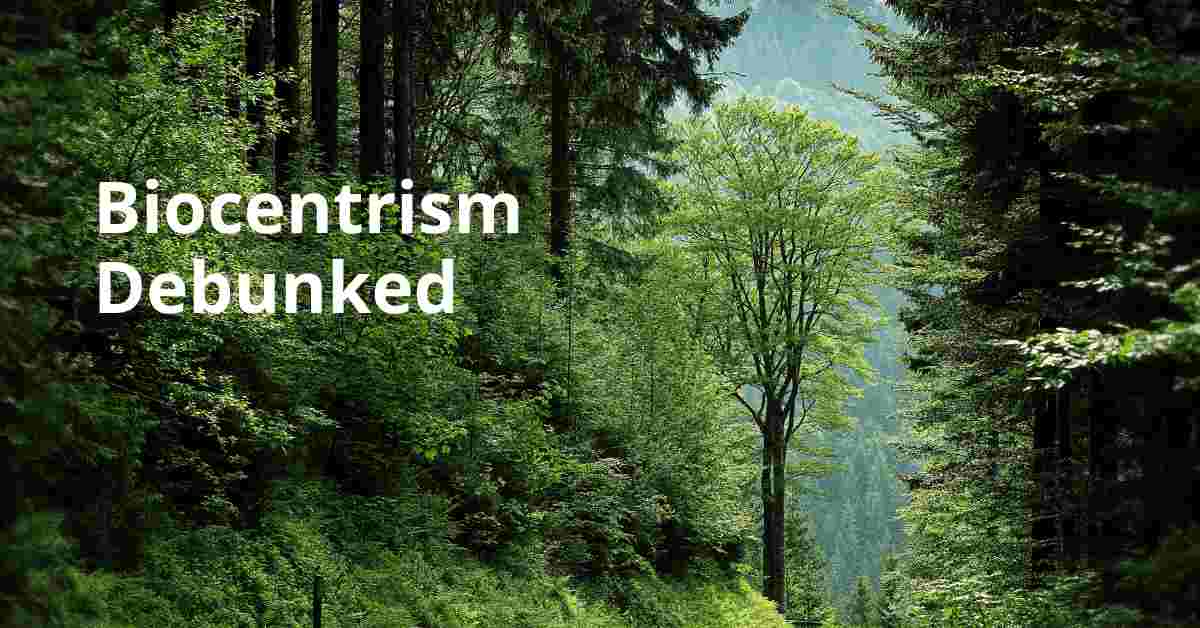Prepare to embark on a journey that challenges conventional wisdom and shakes the foundations of our understanding of reality. In this captivating blog post, we delve into the hotly debated topic of Biocentrism Debunked and seek to uncover the truth behind its claims.
Biocentrism has gained significant attention in recent years, presenting a radical perspective that places all living organisms at the center of existence. According to this philosophy, life itself is not merely an accidental byproduct of physical processes but an essential component shaping the very fabric of our universe.
But does biocentrism hold up under scrutiny? Are its assertions grounded in scientific evidence or mere speculation? Join us as we explore the criticisms and debunking surrounding biocentrism, examining alternate theories that challenge its validity. Let’s separate fact from fiction and unravel one of science’s most intriguing controversies!
Understanding Biocentrism
Biocentrism, at its core, is a philosophical perspective that places life itself as the fundamental principle of existence. It challenges the long-held belief that consciousness is solely a product of the physical world and proposes that it is instead an essential element shaping our reality. According to biocentrism, all living organisms possess inherent value and deserve moral consideration.
This theory suggests that our perception of the universe is intrinsically linked to our conscious experience as living beings. It rejects the notion that life is nothing more than a random occurrence in an indifferent cosmos. Instead, biocentrism argues for a more profound interconnectedness between all living things, asserting that we actively shape our reality.
Proponents of biocentrism argue that recognizing the importance of other life forms can foster more tremendous respect and empathy towards animals, plants, and ecosystems. This philosophy encourages us to view ourselves as part of a larger whole rather than separate entities in isolation.
While some find solace in this idea – finding comfort knowing their actions have consequences beyond themselves – others remain skeptical about the validity and practicality of such claims. Critics raise valid concerns about potential biases introduced by attributing special significance exclusively to life forms with complex cognitive abilities like humans.
Understanding biocentrism requires delving into its underlying principles and questioning its implications on various aspects ranging from ethics to science. By exploring both sides of this intriguing debate surrounding biocentrism’s merits or shortcomings, we can gain valuable insights into humanity’s ongoing quest for answers about our place in the grand tapestry of existence.

The Philosophy Behind Biocentrism
Biocentrism is a philosophical concept that challenges the traditional anthropocentric view of the universe. It posits that all living beings, not just humans, hold intrinsic value and are deserving of moral consideration. This philosophy asserts that life is central to our understanding of reality.
At its core, biocentrism emphasizes interconnectedness and interdependence among all living things. It recognizes the intricate web of relationships within ecosystems and highlights the importance of preserving biodiversity. According to this perspective, every organism has a unique role in maintaining ecological balance.
Biocentrism also acknowledges the inherent worthiness of non-human entities such as animals, plants, and even ecosystems. It argues against exploiting or commodifying nature for human gain, advocating for responsible stewardship and respect towards all life forms instead.
This philosophy challenges deep-rooted beliefs about humanity’s superiority over other species and calls our place in the natural world into question. By shifting our perspective from human-centric to life-centric, biocentrism encourages us to reevaluate our ethical responsibilities towards nature.
Critics argue that biocentrism can be impractical or overly idealistic when making real-world decisions regarding resource allocation or conflicting interests between humans and other species. They contend that prioritizing all forms of life equally may not always align with practical considerations or societal needs.
However, proponents believe embracing a biocentric worldview can lead to more sustainable practices by promoting conservation efforts, fostering empathy towards non-human beings, and inspiring innovative solutions rooted in ecological harmony.
The debate surrounding biocentrism remains ongoing as different perspectives clash on how we should prioritize various aspects of existence. Ultimately though if nothing else Biocentrim reminds us there is much yet unknown about existence what we know now could very well change tomorrow!
Criticisms and Debunking of Biocentrism
Biocentrism, the belief that all living organisms hold intrinsic value and should be considered at the center of our ethical framework, has garnered both praise and criticism. While it may seem like a noble concept on the surface, there are several arguments against biocentrism that question its validity.
One major criticism is that biocentrism places an excessive emphasis on individual organisms, neglecting the interconnectedness of ecosystems. Critics argue that focusing solely on individual organisms fails to acknowledge the complex web of relationships between species and their environments. They contend that a more holistic approach, such as ecocentrism or deep ecology, would better address these ecological dynamics.
Another point of contention is whether assigning inherent value to all living beings can lead to practical challenges in decision-making processes. Critics argue that prioritizing the well-being of every organism equally may not always align with human needs or societal progress. For example, they raise concerns about how biocentric principles could hinder necessary actions for public health or economic development.
Furthermore, skeptics claim that biocentrism lacks scientific evidence to support its claims fully. While proponents often cite examples from biology and ecology to bolster their arguments, critics argue that this does not provide sufficient justification for placing all life forms at equal importance within moral frameworks.
Some alternate theories also challenge the basic tenets of biocentrism. For instance, anthropocentric views prioritize humans’ interests above other species based on our unique cognitive abilities and consciousness. On the other end of the spectrum lie theories such as cosmopolitan ethics or sentient-centric perspectives which extend moral consideration beyond just living beings.
Despite these criticisms and alternative viewpoints challenging some aspects of biocentrism’s philosophy, it remains important to engage in open dialogue about ethical frameworks concerning our relationship with nature. By critically examining different perspectives alongside scientific evidence and societal needs we can continue evolving our understanding while striving for a more sustainable and harmonious world.
Scientific Evidence Against Biocentrism
Biocentrism, the idea that life and consciousness are central to the universe, has been a topic of great controversy in scientific circles. While it may sound appealing on a philosophical level, there is a lack of empirical evidence to support its claims.
One of the main criticisms against biocentrism is that it contradicts well-established scientific principles such as the laws of physics. According to these laws, energy can neither be created nor destroyed but only transformed from one form to another. Biocentrism suggests that consciousness creates reality, which goes against our current understanding of how the physical world functions.
Furthermore, biocentrism fails to provide any concrete explanations or predictions about natural phenomena. In contrast, scientific theories like evolution by natural selection have withstood rigorous testing and have provided us with valuable insights into the origins and diversity of life on Earth.
In addition, experiments conducted in fields such as neuroscience challenge the notion that consciousness plays a fundamental role in shaping reality. These studies suggest that consciousness arises from complex neural processes rather than being an inherent property of the universe itself.
While biocentrism offers an intriguing perspective on our place in the cosmos, it lacks robust scientific evidence to support its claims. Scientists continue to explore alternative theories and conduct research aimed at unraveling some of nature’s deepest mysteries.
Alternate Theories About the Universe and Life
In addition to biocentrism, several other theories attempt to explain the nature of the universe and life itself. One such theory is panspermia, which suggests that life on Earth may have originated from microorganisms or biochemical compounds brought here by comets or meteorites from outer space.
Another intriguing theory is simulation theory, which proposes that our reality is a computer-generated simulation. This idea has gained popularity recently due to technological advancements and simulations becoming more prevalent daily.
The multiverse theory posits that our universe is one of many parallel universes coexisting simultaneously. Each universe would have its own set of physical laws and conditions, resulting in infinite possibilities and variations.
Some scientists also entertain the possibility of extraterrestrial life existing elsewhere in the vast expanse of the cosmos. The search for extraterrestrial intelligence (SETI) continues through initiatives like radio telescopes scanning deep space for signs of intelligent civilizations.
These alternate theories challenge traditional notions about our place in the universe and offer fascinating perspectives on how life could have originated and evolved. While they may not have as much mainstream acceptance as biocentrism or other established scientific theories, they encourage us to think outside the box and consider possibilities beyond what we currently understand.
As research progresses, new ideas will continue to emerge, challenging existing paradigms and shaping our understanding of existence itself. It’s important to approach these alternate theories with an open mind while maintaining a critical mindset based on empirical evidence.
By exploring different avenues of thought, we can expand our knowledge base and gain deeper insights into profound questions about the nature of reality, consciousness, and our place within it all. Whether any particular theory turns out to be true remains uncertain; however, their exploration enriches scientific discourse by fostering curiosity, innovation, and a relentless pursuit of truth.
Relevance of Biocentrism in Modern Society
In today’s fast-paced and increasingly interconnected world, the concept of biocentrism holds significant relevance. At its core, biocentrism emphasizes the intrinsic value of all living beings and their equal right to exist. This philosophy challenges anthropocentric views that prioritize human needs above those of other species.
Biocentrism encourages us to consider the impact our actions have on the natural world. By recognizing the interdependence between humans and nature, we can strive for a more sustainable future. This mindset promotes responsible environmental stewardship, advocating for practices that minimize harm to ecosystems and protect biodiversity.
Furthermore, embracing biocentrism can lead to a shift in how we view animals. Instead of seeing them solely as resources or commodities, we recognize their inherent worth and treat them with compassion and respect. This perspective extends beyond traditional notions of animal rights towards a deeper understanding of our shared existence on this planet.
Additionally, incorporating biocentric principles into ethical decision-making processes can help address complex moral dilemmas related to advancements in technology and bioengineering. Considering the welfare and integrity of all living beings involved, we can navigate these issues more sensitively.
Adopting a biocentric worldview encourages us to reevaluate our place within the natural world. It reminds us that every action has consequences – not just for ourselves but for all life forms around us. As modern society grapples with pressing global challenges such as climate change and species extinction rates, embracing biocentrism offers an alternative framework to approach these issues holistically.
So let us pause amidst our bustling lives, reflect upon how our choices affect other living beings; let us embrace this philosophy that celebrates life in all its diverse forms – because only then can we truly forge a harmonious coexistence with nature in modern society.
Conclusion: Is Biocentrism a Valid Theory?
After exploring the concept of biocentrism and delving into the criticisms and debunking attempts, it becomes apparent that there is no definitive answer to whether biocentrism is a valid theory or not. While some proponents passionately argue for its validity based on philosophical and subjective perspectives, others find scientific evidence lacking.
Biocentrism presents an intriguing idea that challenges conventional thinking about our place in the universe. It offers a perspective where consciousness plays a central role in shaping reality. However, this viewpoint has faced substantial criticism from scientists who question its empirical basis and lack of rigorous scientific testing.
Despite the controversies surrounding biocentrism, it has sparked valuable discussions about consciousness, existence, and our relationship with nature. The exploration of alternate theories such as anthropocentrism or even non-anthropocentric views like ecocentrism adds depth to our understanding of life’s mysteries.
In modern society, as we grapple with environmental crises and ethical dilemmas concerning animal rights and habitat destruction, concepts like biocentrism continue to play a significant role. It reminds us of the interconnectedness between all living beings on Earth and calls for greater respect towards nature.
Whether one accepts or rejects biocentrism as a valid theory depends on personal beliefs, experiences, cultural backgrounds, and individual interpretations of science. As we continue to explore the depths of our existence and seek answers about life’s fundamental questions, it remains essential to approach these debates with an open mind while embracing critical thinking.
So let us ponder upon these fascinating ideas without seeking absolute certainty but rather reveling in the wonderment that they inspire – for it is through such intellectual explorations that we push boundaries forward towards new discoveries and understandings!
Also Read, Nyonisela Sioh





